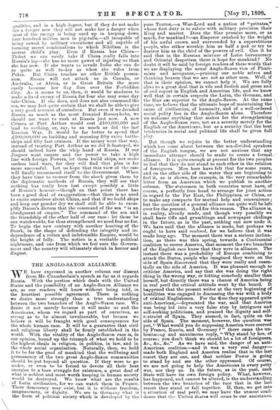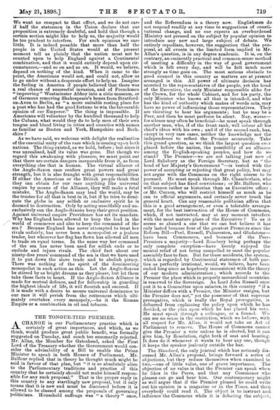THE ANGLO-SAXON ALLIANCE.
WE have expressed in another column our dissent from Mr. Chamberlain's speech as far as it regards Russia. With the portion which deals with the United States and the possibility of an Anglo-Saxon Alliance we are, as our readers will know without being told, in the heartiest possible agreement. There is nothing we desire more strongly than a true understanding between the two branches of the Anglo-Saxon race. We desire it not merely because it will make us and the Americans, whom we regard as part of ourselves, so strong as to be almost invulnerable, but becaus. we believe it will be fraught with good consequences for the whole human race. It will be a guarantee that civil and religious liberty shall be firmly established in the world. With the vitality of the Anglo-Saxon race is, in our opinion, bound up the triumph of what we hold to be the highest ideals in religion, in politics, in law, and in the whole social organisation. Naturally, then, we hold it to be for the good of mankind that the wellbeing and permanency of the two great Anglo-Saxon communities should be put beyond all question. If they were to go under, or even to be forced to devote all their best energies to a, bare struggle for existence, a great deal of what is noblest and most worth keeping in human society would be destroyed. We know what are the results of Latin civilisation, for we can watch them in France. There democracy may exist, but it is without freedom, magnanimity, or dignity. We see in Germany what is the form of political society which is developed by the pure Teuton,—a War-Lord and a nation of "privates," whose first duty is to salute with military precision their King and master. Does the Slav promise more, or as much, for mankind?—an Emperor crushed by the weight of his awful crown and surrounded by a superstitious people, who either worship him as half a god or try to destroy him as the chief of the powers of evil. Can it be said that in the Russian mixture of Latin bureaucracy and Oriental despotism there is hope for mankind ? No doubt it will be said by foreign readers of these words that we are displaying the usual Anglo-Saxon vice of Phari- saism and arrogance,—praising our noble selves and thanking heaven that we are not as other men. Well, if that is their opinion, we cannot help it. We are fully alive to a great deal that is vile and foolish and gross and of evil report in English and American life, and we know well that in certain respects the Latin, the German, and the Slav ase superior to the Anglo-Saxon. At the same time, we believe that the ultimate hope of maintaining the cause of civilisation, of humanity, and of a well-ordered social polity lies in the Anglo-Saxon alone. Therefore we welcome anything that makes for the strengthening of the Anglo-Saxon race, not as a security merely for the English or the Americans, but as a security that the best tendencies in social and political life shall be given full play.
But though we rejoice in the better understanding which has come about between the sea-divided speakers of the English tongue, we are not anxious that any immediate attempt should be made to create a formal (-- alliance. It is quite enough at present for the two peoples to feel that they do not stand to each other in the relation of foreigners. Men here have felt that for some years, and on the other side of the water they are beginning to feel it, as is shown, for example, in the very remarkable letter from an American which we publish in another column. The statesmen in both countries must have, of course, a perfectly free hand to arrange for joint action in regard to the Far East, the Philippines, or China, or to make any compacts for mutual help and convenience ; but the question of a general alliance can quite well be left over for the present. And for this reason. The alliance is, in reality, already made, and though very possibly we shall have tiffs and grumblings and newspaper chidings in the future, as in the past, nothing can now undo it. We have said that the alliance is made, but perhaps we ought to have said realised, for we believe that it was made long ago. The moment there was a serious inclina- tion, as there was this spring, towards a Continental coalition to coerce America, that moment the two branches of the English race knew that they were in alliance. The instant there was a probability of Europe combining to attack the States, people who imagined they were on the side of Spain discovered that they were really and essen- tially on the side of America. It was pleasant enough to criticise America, and say that she was doing the right thing in the wrong Way, or hitting somebody smaller than herself, but directly there was a chance of America being in real peril the critical attitude went by the board. It happened that the present writer at the very beginning of hostilities was engaged in discussing the war with a body of critical Englishmen. For the tf me they appeared quite anti-American,—deprecated the war, said that America was being led into a very false step by intriguers and self-seeking politicians, and praised the dignity and self- restraint of Spain. They seemed, in fact, quite on the side of Spain. The moment, however, the question was put," What would you do supposing America were coerced by France, Russia, and Germany ? " there came the un- hesitating and unanimous reply, " Why stand by her, of course; you don't think we should let a lot of foreigners, &c., &c., &,c." As we have said, the danger of an anti- American coalition—and it was a very real danger— made both England and America realise that in the last resort they are one, and that neither Power is going to stand by and see the other oppressed. Of course, , we are not going to help the Americans in every petty war, nor they us. In the future, as in the past, each State will have its own foreign policy. What, however, has happened, and cannot be altered, is the understanding between the two branches of the race that in the last resort they stand or fall together. If, then, we get into a situation of real peril, we may have the utmost confi- dence that the United States will come to our assistance. We want no compact to that effect, and we do not care if half the statesmen in the Union declare that our proposition is extremely doubtful, and hold that though a certain section might like to help us, the majority would be too prudent to interfere. For such opinions we care little. It is indeed possible that more than half the people in the United States would at the present moment tell us plainly that the nation must not be counted upon to help England against a Continental combination, and that it would entirely depend upon cir- cumstances,—and so on and so on. It would, we believe, depend on nothing of the kind. When it came to the point, the Americans would not, and could not, allow us to go under without a desperate effort to help us. Imagine the feeling in America if people believed that there was a real chance of successful invasion, and of Frenchmen "improving" Westminster Abbey into a civic museum, or of Germans removing Shakespeare's bones from Stratford- on-Avon to Berlin, as " a more suitable resting place for a poet who has had the good fortune to win the favourable opinion of our Emperor." The thing is impossible. If Americans will volunteer by the hundred thousand to help the Cubans, what would they do to help men of their own tongue and blood living in cities and counties with names as familiar as Boston and York, Hampshire and Berk- shire ?
As we have said, we welcome with delight the realisation of the essential unity of the race which is coming upon both nations. The thing existed, as we hold, before ; but since it was unrealised, half its value was gone. But though we regard this awakening with pleasure, we must point out that there are certain dangers inseparable from it, as from everything else that is human. The virtual alliance of the Anglo-Saxon race confers great powers and great strength, but it is also fraught with great responsibilities. If either the American or the British people think that they can obtain for our race anything like universal empire by means of the Alliance, they will make a fatal mistake. The Anglo-Saxon may lead the world, may be the trustee for all that is best in it, but if he tries to domi- nate the globe in any selfish or exclusive spirit he is doomed to destruction. Only by acting unselfishly and un- exclusively can the Anglo-Saxons keep their great position. Against universal empire Providence has set its mandate. Why has England been allowed to keep the lead in the world of commerce and also to keep the command of the sea ? Because England has never attempted to treat her rivals unfairly, has never been a monopolist or a jealous trader, but wherever her flag has flown has allowed all men to trade on equal terms. In the same way her command of the sea has never been used for selfish ends or to exclude and injure rivals. The chief fact about our ninety-five years' command of the sea is that we have used it to put down the slave trade and to abolish piracy. There was nothing of the spirit of the domineering monopolist in such action as this. Let the Anglo-Saxons be stirred by as bright dreams as they please, but let them take these facts to heart. If the Anglo-Saxon Alliance is made for mutual defence, and for fellowship in guarding the highest ideals of life, it will flourish and succeed. If it is made with a desire to secure universal dominance to our race it will perish from the rottenness which ulti- mately overtakes every monopoly,—be it the Roman Empire or a combination in oil and tobacco.



































 Previous page
Previous page